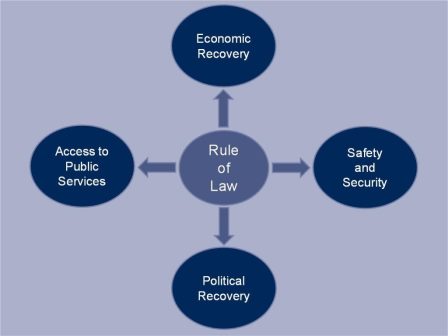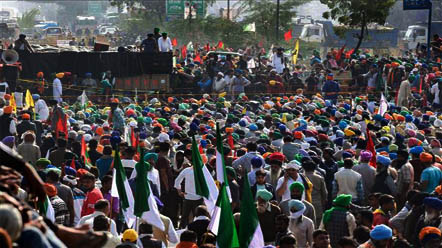Concept of Rule of Law
2020-03-02 - Admin | Blog Page

INTRODUCTION
The principle of rule of law is derived from the French phrase ‘la principe de legalite’, which means the principle of legality. In simple terms rule of law implies to a government based on principle of law and not of man. It is the rule of law, which makes India as world largest democracy. The concept of rule of law is very dynamic and capable of interpretation in different context. Rule of law is the tool to provide protection from the arbitrary exercise of power by the government. Law should govern the nation and not the arbitrary decisions by individuals. The principle of rule of law upheld the doctrine of supremacy of law. Concept of rule of law embodied in the Indian constitution – in the Preamble and in Part 3rd. The Indian Constitution in various provision adopt the concept of rule of law like Universal adult Franchise, Independent judiciary, Judicial review, Right to equality before law etc, in which we can see the root of rule of law.
Dicey Principle of rule of law
It is very much true to say that our framers of Constitution have habit to adopt the doctrine of rule of law in almost provision of our constitution and through various case laws. If we see the earlier meaning of Rule of Law, there are three distinct ideas which were given by Dicey, which are as follows:
- (a) Absence of arbitrary Power- it means no man is above law. no man is
punishable except for distinct breach of law established in an ordinary
legal manner before ordinary court.
(b) Equality before the law- It talks about equal protection of law as well. According to him special law and special courts is a threat to the principles of equality.
(c) Individual liberty – It is general principal of the British Constitution and especially the liberties of the individual. Dicey emphasis on the whole in his enunciation of Rule of Law is the absence of arbitrary power and discretionary power, Equality before the law and legal protection of certain basic structure of human rights, and these ideas remain relevant and significant in every democratic country even today.
Rule of Law has no fixed or articulate connotations though the Indian court refers to this phrase time to time again. The broad emphasis of Rule of Law is on absence of any unlimited or arbitrary power in the country, on proper structuration and control of power, absence ofarbitrariness in the government.
Position of Rule of law in Indian Constitution
To develop Indian democracy, rule of law has played a great role. At the time of framing of constitution, the framers had two options I.e. USA and England. Some of the provisions were adopted from England. Rule of law was adopted from England by our constitutional fathers and many provisions absorb in the Indian constitution. In modern times there are no drafts in which rule of law is directly discussed or mentioned. The rule of law as administered in India is interpreted to be embodied within several provisions of the constitution. The framers of our constitution were not only familiar with the postulates of rule of law as propounded by Dicey but also as modified by its action in British India. Indian constitution is considered to be supreme and no one is above Indian constitution. Rule of law is also given impliedly in the preamble and such concept is enshrined in part 3 of the Indian constitution. In case of violation of such rights, one can approach the supreme courtor high court under Art. 32 and 226 of Indian constitution.Under Art.32 of the Indian constitution, the Supreme Court has the power to issue writs in the nature of habeas corpus, mandamus, prohibition, quo warrantors, and certiorari. Further art.13 (1) of Indian constitution states that any law that is made by the legislature has to be made in conformity with the constitution falling which it will be declared invalid. The framers of Indian constitution had embodied the rule of law in the moral sense of our constitution. The three body of the government work in harmonizing with each one for the establishment of rule of law. The judiciary has worked efficiently towards the establishment of rule of law and it equally supported by the people and government by obeying the laws as laid down by the parliament and elucidated by the judiciary.
RELEVENT CASE LAWS
In Union of India v. President, Madras Bar Association
The SC held that “Rule of Law has several facets, one of which is that disputes of citizens will be decided by judges who are independent and impartial; and that disputes as to legality of acts of the government will be decided by judges who are independent of Executive.” Justice R.S. Pathak of the Hon’ble Supreme Court has observed that “it must be remembered that our entire constitutional system is founded on the rule of law, and in any system so designed it is impossible to conceive of legitimate power which is arbitrary in character and travels beyond the bound of reason.”
ADM Jabalpur v. ShivakantShukla
This case is also known as habeas corpus case. It is one of the most important case when comes to rule of law. The question that was raised before the Honourable court was that whether there was any rule of law in India apart from art.21 of the Indian constitution. It was in context relating to the proclamation of emergency where the enforcement of articles 14,21 and 22 were suspended.
KeshvanandaBharti v. State of Kerala
In this case, the Supreme Court enunciated the concept of rule of law as one of the most important aspects of rule of law as one of the most important aspects of doctrine of basic structure.
Maneka Gandhi v. Union of India
In this case Supreme Court declared that Article 14 strikes against arbitrariness. The court ensured that the exercise of power in an arbitrary manner by the Government would not infringe the right of the people.
Need of ‘rule of law’ in current scenario
Rule of law promotes the democratic values in the every government and aspires to establish an egalitarian social order. In the word of Abraham Lincoln Democracy has been defined as “the government of the People, by the People and for the people’’, this implies the establishment of rule of law without any arbitrariness power. So, true meaning of democracy can only be seen through the lens of concept of rule of law. If any form of government exceeded its limitation, the rule of law comes into limelight. For the proper implementation of any law, rule of law must be upheld. It is the positive concept which is necessary to establish the social order and proper balance in the democratic society. It is necessary to establish faith of every citizens of the country in the rule of law, which assures them that they are secure, and that they will not denied justice at all. In the process of imparting justice, judiciary must be seen to take steps in order to play its very significant role to communicate to the nation that their faith in the system is for good reason. The rule of law is the fundamental principle of any Constitution. It states that every person in land, no matter how powerful or high in status he may be, law will always be above them. According to rule of law, no person can be said to above law, even the function and actions of the executive organ of the state shall be within the ambit of law.








